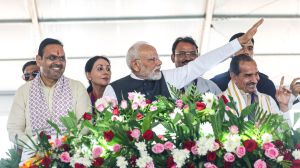Provide hostel to visually challenged student for free: HC directs JNU
JNU had earlier argued that the provisions of the JNU Hostel Manual did not entitle Mishra to hostel accommodation as he was pursuing a second master's degree.
 The High Court said that the distinction that the JNU sought to draw between students who are pursuing the same level of degrees, such as Masters — a second time with the JNU and "fresh" students — has no legal basis as "both are students". (File Photo)
The High Court said that the distinction that the JNU sought to draw between students who are pursuing the same level of degrees, such as Masters — a second time with the JNU and "fresh" students — has no legal basis as "both are students". (File Photo)While upholding the entitlement of a 100% visually challenged master’s student at Jawaharlal Nehru University (JNU) to hostel accommodation, the Delhi High Court directed the varsity to provide “free of cost” facilities to the student within a week, starting Monday.
The High Court was hearing a plea by Sanjeev Kumar Mishra, a MA student in Sociology at JNU, in which he mentioned that he has not been allotted any hostel since his admission to the varsity on November 23, 2022.
JNU had earlier argued that the provisions of the JNU Hostel Manual did not entitle Mishra to hostel accommodation as he was pursuing a second master’s degree.
Underscoring the “inclusivity” and “integration into mainstream of society” as the purpose of the Rights of Persons with Disabilities Act (RPwD), a single-judge bench of Justice C Hari Shankar observed in its order, “Persons who suffer from disabilities, as recognised by the RPwD Act, are no different from you or me… The RPwD Act and all laws which strive to provide support to a person suffering from a disability, merely seek to neutralise the disability, so that the person’s ability matches those of the rest of his peers, and they stand on an equal footing. This is the heart of the theory of equal opportunity, which pervades Article 14 and, indeed, the Constitution as a whole.”
Stating that the appropriate term would be “differently abled” rather than “disabled”, Justice Shankar also observed that if an educational institution fails to provide facilities to enable a differently abled student to “utilise the educational opportunity in full measure”, then it is a “clear and transparent breach” of the Act. It said that “place to stay within the precincts of the institution” is indispensable to availing the facilities provided by the institution in their full measure.
The High Court said that the distinction that the JNU sought to draw between students who are pursuing the same level of degrees, such as Masters — a second time with the JNU and “fresh” students — has no legal basis as “both are students”.
“The ‘differentia’, if at all there exists one, between differently abled students who have earlier pursued a course with the JNU and those who are pursuing one for the first time, has no rational nexus with the object of ensuring that a student studying in the JNU, who is differently abled, has a place to stay. A student who is pursuing a second Master’s degree course with the JNU, having already pursued and completed one, is as entitled to a place to stay as a student who is joining JNU for the first time. The needs of one cannot be sacrificed at the altar of the needs of the other. The concept of ‘evergreening of tenancy’ is a mythical and nebulous concept, which has no constitutional backing whatsoever,” underscored Justice Shankar.







